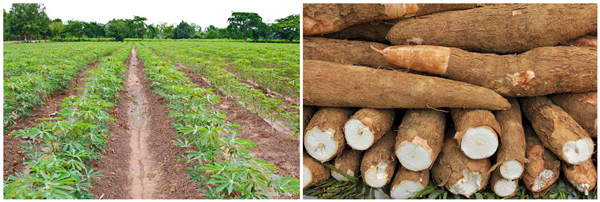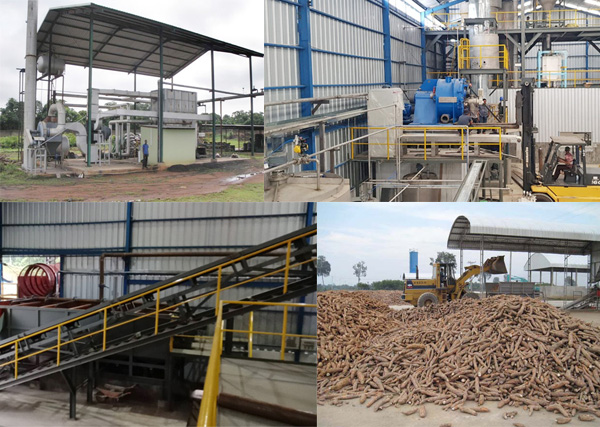Industrial uses of cassava in Nigeria
Industry News / Chat online / Technical support / 2019-03-30
Nigeria is the world's largest producer of cassava. In Nigeria, cassava root is mainly used to make different kinds of local food, like garri, fufu, akpu, etc. They can also be cooked directly or eaten. However, with the development of industrialization, industrial uses of cassava in Nigeria is more and more popular. So what are the main industrial uses of cassava in Nigeria?
 Cassava
Cassava
One of the industrial uses of cassava in Nigeria is the processing of cassava into starch for industrial production. Cassava starch is a powdery product made by cassava root after being ground and then separated fibers, proteins and other impurities, and then dehydrated and dried. It is an important industrial raw material and can be used in chemical, adhesive and glue, paper, textile, pharmaceutical and cosmetic, biodegradable materials and other industrial fields. There are about 350,000 tons of cassava starch demand in Nigeria, and there is a vast market in the world. Therefore, the industrial uses of cassava in Nigeria is very promising in starch production. However, the current industrialization of cassava starch processing in Nigeria is insufficient, and there are few local manufacturers of cassava starch processing equipment. Therefore, the current cassava starch industry in Nigeria is mainly small processing workshop. There are also large-scale or medium-scale starch factories that choose to purchase equipment for cassava starch processing in foreign countries. They prefer Chinese manufacturers because of the advanced technology and cost-effectiveness of starch equipment in China. The processed cassava starch can be sold in Nigeria to the food industry such as Nestle, Nigeria Flour Mill and Cadbury, or used in textile industry or exported to foreign countries.
 Cassava starch for industrial uses
Cassava starch for industrial uses
In addition, the industrial uses of cassava in nigeria also includes high quality cassava flour. Cassava flour is a powdery product made by directly dehydrating and drying cassava after being ground. In Nigeria, cassava flour is mainly used in the food industry as a substitute for wheat flour. In cakes and baked goods, 20% cassava flour can be used instead of wheat flour, which will not only affect the taste of food, but also promote cassava production and reduce wheat flour imports. High-quality cassava flour has a large market demand for local employment in Nigeria, in addition to bread processing, baked goods, etc., potential buyers of cassava flour also include Nigerian breweries, because cassava flour can also be used for ethanol production.
 Cassava flour for bread and ethanol production
Cassava flour for bread and ethanol production
In addition, industrial uses of cassava in nigeria also includes feed industry. Cassava or cassava chips can both be used for feed. With the application industrial uses of cassava in Nigeria, the demand for industrial processing of cassava in Nigeria is increasing. Cassava is no longer grown only by the poor, but a Nigerian crop with industrial potential. The Nigerian government should further promote the industrial uses of cassava in Nigeria, so that cassava can achieve commercial production of cassava while meeting local food demand, which is very beneficial to promote Nigeria's economic development and increase employment. At the same time, Nigeria needs to increase its processing capacity to cope with the growing global market demand.
 Mechanized cassava processing
Mechanized cassava processing
The innovative demand for cassava processing technology in Nigeria is enormous. Traditional cassava processing takes a long time, with low yields and lacks storage capacity. Therefore, modern machining is a new way to expand the industrial uses of cassava in Nigeria. As a professional cassava processing equipment manufacturer, Doing Company can provide you with professional cassava processing equipment and provide cassava engineering such as plant design, installation and commissioning. With the gradual maturity of various deep processing technologies, cassava has gradually become the world's recognized high-value economic crops and important industrial raw materials, with an annual global trade volume of 20 billion US dollars. Therefore it is a wise decision to engage in cassava processing at present.

 Call us
Call us Chat online
Chat online

